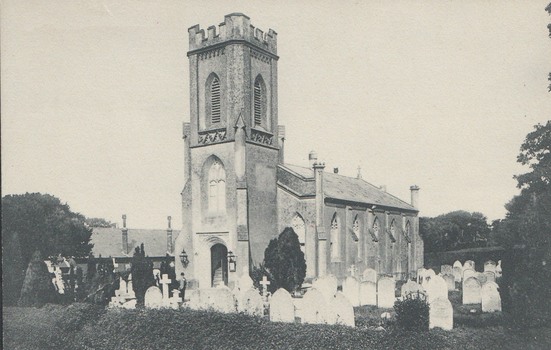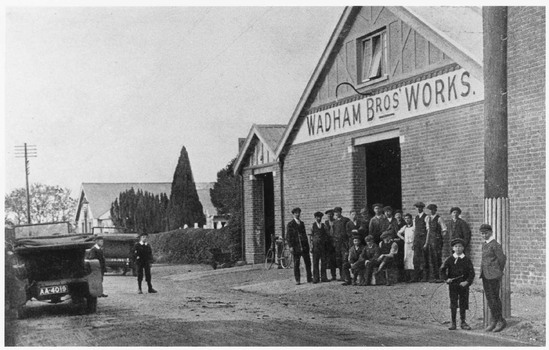Part 2 of the article researched by John Symonds, recalling memories of Canon Arthur Suffrin, the son of the Rev. Aaron Emmanuel Suffrin, Vicar of St George’s from 1909-1926.
I used to be taken to Matins when I was very young and loved it. I got to know the Litany by heart and recited it at home. The church was cold and damp and I remember the words “Holy Holy Holy” peeling off the damp chancel arch. Our squire Mr Hulbert had a pew behind the pulpit which was enclosed. There was only a tatty red cloth with IHS embroidered on it and always the same at all seasons of the year. The congregation was rabidly Protestant and when my father turned East to say the Creed one woman was so disgusted that she turned west to counteract it and so during the Creed we could see her facing us.
Many of the inhabitants were retired naval and army officers. When the church hall was first opened (1913) Capt Bawden RN Retired started a Sunday School there. His wife was a real power in the village and everyone was terrified of her, except us, because she and my mother were good friends. When another powerful woman, a Mrs Christie, came to live in the village people began to say “you can’t have two such people running the village - one of them will have to leave.” Mrs Christie soon left.
When Mrs Bawden walked into the Sunday School there was always dead silence. Lady Napier, daughter of General Napier was the most important person in the village. She gave her house to be made into a hospital for wounded men during the Great War and she was Commandant. She moved into a house in Wallis Road and used to invite me to tea.
I recall Mrs Neal the church caretaker coming and complaining that people were picnicking in the church and that people who arranged dances in the hall were annoyed because the Badminton Club put stuff on the floor to make it less slippery… I remember Pook the Postmaster. He became a licensed Reader and conducted services at Cowplain.
There used to be a linen drapery shop kept by a Mr Wadham. He had two sons and wanted them to carry on the business. One did but the other son Peter said “I’m not going to spend my life selling buttons and ribbons, I’m going to set up a little shed by the side of the road and repair motor cars. His father said “There’s no future in that”. At first Peter did badly and had to borrow £200 from his father. Then came the Spithead Naval review in 1914 and lots of cars came down the road leading to Portsmouth. Many broke down in Waterlooville and Peter Wadham repaired them. After that he never looked back and Wadham Garages prospered.
When my father arranged the annual Sunday School outing he and Mr Bowden decided to join forces with the Baptist Sunday School. Some people were furious and withdrew their children from the outing rather than let them mix with the Baptist children. Another woman said she was leaving the church because she had seen my father standing in the street talking to the Roman Catholic priest. She said she was sure he was a Jesuit in disguise. These are the only ecumenical overtures I can remember!
My father was a difficult man to get on with. He was a good preacher though too learned for the village. If you ever see a copy of Hastings Encyclopaedia of Religion and Ethics look up “God - Jewish” and you will have some ideas how learned he was. When I studied Hebrew at Cambridge, if during the vacation I quoted the first half of a verse from, say, Isaiah, he could repeat the second half in Hebrew by heart.
During the First World War he spent several days in London each week at the War Office. He was the only person they could find who could translate letters written in Portuguese but in Arabic script. The vicar at Portsdown looked after any emergencies in the parish during his absence.
• to be continued






